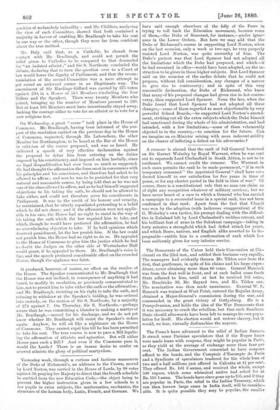Yesterday week, through a curious and factious manoeuvre of the
Duke of Richmond's, an addresss to the Crown, moved by Lord Norton, was carried in the House of Lords, by 98 votes against 50, praying her Majesty to direct that the fourth schedule be omitted from the new Education Code,—the object being to prevent the higher instruction given in a few schools to a few pupils in extra subjects, like mathematics, mechanics, the structure of the human body, Latin, French, and German. We have said enough elsewhere of the folly of the Peers in trying to roll back the Education movement, because some of them,—the Duke of Somerset, for instance,—prefer ignor- ance in the Lower Orders. But here we may add that the Duke of Richmond's course in supporting Lord Norton, when on the last occasion, only a week or two ago, he very properly resisted Lord Norton, was quite unworthy of him. The Duke's pretext was that Lord Spencer had not adopted all the limitations which the Duke had proposed, and which—if he had remained in office—would have been adopted, on the in- struction to be given in these higher subjects. But Lord Spencer said on the occasion of the earlier debate that he could not propose, without full consideration, any changes of a nature to give rise to controversy ; and in spite of this very reasonable declaration, the Duke of Richmond, who knew that many of his proposed changes had given rise to hot contro- versy, then supported Lord Spencer. None the less, when the Duke found that Lord Spencer had not adopted all these changes,—some of them regarded as most objectionable by very powerful School Boards,—he supported Lord Norton's amend- ment, striking out all the extra subjects which the Duke himself had sanctioned during the whole of his administration, and had intended, with a few limitations,—some of them vehemently objected to in the country,—to sanction for the future. Can we imagine an ex-Minister seizing with more indecent avidity on the chance of inflicting a defeat on his adversaries ?


































 Previous page
Previous page